十四行诗 sonnet18
Sonnet 18 By William Shakespeare

Sonnet 18By William ShakespeareShall I compare thee to a summer’s day?Thou art more lovely and more temperate: Rough winds do shake the darling buds of May, And summer’s lease hath all too short a date: Sometimes too hot the eye of heaven shines And often is his gold complexion dimed;And every fair form fair sometimes declines,By chance or natu re’s changing course untrimmed; But thy eternal summer shall not fade,Nor lose poss ession of that fair thou ow’st;Nor shall death br ag thou wander’st in his shade. When in eter nal lines to time thou grow’st:So long as men can breathe,or eyes can see,So long lives this,and this gives life to thee. 十四行诗(其十八)威廉·莎士比亚我能把你比作夏日吗?尽管你更可爱、更温和;夏日的狂风可能会摧残五月的花儿,季节的限制又减少了可拥有的日光;天空的巨眼有时过于灼热,常使自身的辉煌无故湮没;每一种美都会消逝,不管愿意或是无奈;然而你这盛夏将永存不朽,连你所有的美都不会褪去;死神不忍逼近,生命只会长存;只要人类能呼吸,能看见;我的诗就会存在,而你的生命也会延续。
莎士比亚-sonnet-18-29-66的中文翻译及评析

18莎士比亚的十四行诗总体上表现了一个思想:爱征服一切。
他的诗充分肯定了人的价值、赞颂了人的尊严、个人的理性作用。
诗人将抽象的概念转化成具体的形象,用可感可见的物质世界,形象生动地阐释了人文主义的命题。
诗的开头将“你”和夏天相比较。
自然界的夏天正处在绿的世界中,万物繁茂地生长着,繁阴遮地,是自然界的生命最昌盛的时刻。
那醉人的绿与鲜艳的花一道,将夏天打扮得五彩缤纷、艳丽动人。
但是,“你”却比夏天可爱多了,比夏天还要温婉。
五月的狂风会作践那可爱的景色,夏天的期限太短,阳光酷热地照射在繁阴班驳的大地上,那熠熠生辉的美丽不免要在时间的流动中凋残。
这自然界最美的季节和“你”相比也要逊色不少。
而“你”能克服这些自然界的不足。
“你”在最灿烂的季节不会凋谢,甚至“你”美的任何东西都不会有所损失。
“你”是人世的永恒,“你”会让死神的黑影在遥远的地方停留,任由死神的夸口也不会死去。
“你”是什么?“你”与人类同在,你在时间的长河里不朽。
那人类精神的精华——诗,是你的形体吗?或者,你就是诗的精神,就是人类的灵魂。
诗歌在形式上一改传统的意大利十四行诗四四三三体,而是采用了四四四二体:在前面充分地发挥表达的层次,在充分的铺垫之后,用两句诗结束全诗,点明主题。
全诗用新颖巧妙的比喻,华美而恰当的修饰使人物形象鲜明、生气鲜活。
诗人用形象的表达使严谨的逻辑推理变得生动有趣、曲折跌宕,最终巧妙地得出了人文主义的结论。
二十九首就是其中的一首。
这首诗热情地歌颂爱情,诗人在创作这首诗时,充分发挥了十四行诗的长处,采用了“先抑后扬”手法,层层推进,波澜起伏,道出了诗人的思想感情发展变化过程,开头四句这样写道:When ,in disgrace with Fortune and men’ eyes ,sI all alone beweep my outcast state ,And trouble deaf heaven with my bootless cries ,And look upon myself ,and curse my fate ,从这四句我们可以读出,一开始诗人悲悲切切地唱出自己的悲惨处境“in disgrace with Fortune and,men’ eyes (失去了幸福,又遭人白眼。
Sonnet18(屠岸)
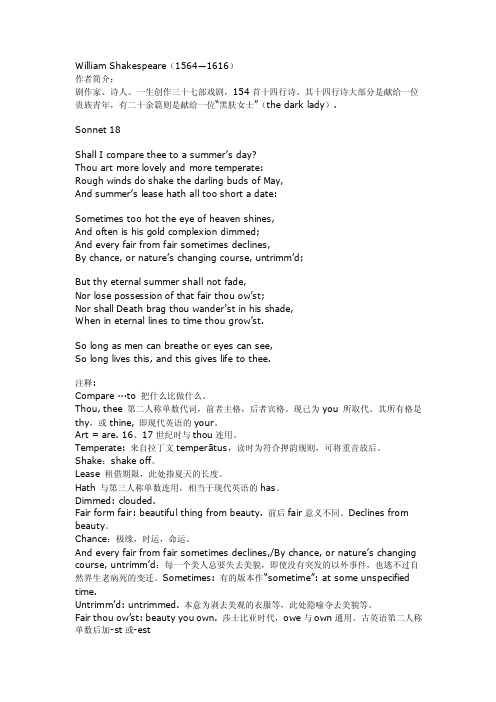
William Shakespeare(1564—1616)作者简介:剧作家、诗人。
一生创作三十七部戏剧,154首十四行诗。
其十四行诗大部分是献给一位贵族青年,有二十余篇则是献给一位“黑肤女士”(the dark lady).Sonnet 18Shall I compare thee to a summer’s day?Thou art more lovely and more temperate:Rough winds do shake the darling buds of May,A nd summer’s lease hath all too short a date:Sometimes too hot the eye of heaven shines,And often is his gold complexion dimmed;And every fair from fair sometimes declines,By chance, or nature’s changing course, untrimm’d;But thy eternal summer shall not fade,Nor lose possession of that fair thou ow’st;Nor shall Death brag thou wander’st in his shade,When in eternal lines to time thou grow’st.So long as men can breathe or eyes can see,So long lives this, and this gives life to thee.注释:Compare ···to 把什么比做什么。
Thou, thee 第二人称单数代词,前者主格,后者宾格。
现已为you 所取代。
Sonet 18

Sonet 18William ShakespeareShall I compare thee to a summer’s day?Thou art more lovely and more temperate. Rough winds do shake the darling buds of May, And often is his gold complexion dimmed;And every fair from fair sometime declines,By chance , or nature’s changing course, untrimmed:But thy eternal summer shall not fade,Nor lose possession of that fair thou owest;Nor shall death brag thou wanderest in his shade When in eternal lines to time thou growest.So long as men can breathe or eyes can see,So long lives this, and this gives life to thee.十四行诗(第十八首)威廉·莎士比亚夏日怎能与妳譬喻比拟妳的可爱温和夏日难及五月花蕾恶风吹袭落地夏日租约倏忽转瞬到期有时天眼高灼炎炎难耐更见乌云常蔽金色面容古今红顏难逃红顏色衰命运无常季候欺凌作弄妳的永恆夏日却将长存美貌红顏必也永世不减死神难夸妳為地府美人因妳芳名已成不朽诗篇除非人世已经灭绝无生此诗必将永传与汝永恆BUT wherefore do not you a mightier wayMake war upon this bloody tyrant, Time?And fortify yourself in your decay[di'kei]With means more blessèd than my barren rime? Now stand you on the top of happy hours,And many maiden gardens, yet unset,With virtuous wish would bear your living flowers, Much liker than your painted counterfeit:So should the lines of life that life repairWhich this time's pencil or my pupil pen,Neither in inward worth nor outward fairCan make you live yourself in eyes of men.To give away yourself keeps yourself still,And you must live, drawn by your own sweet skill.但是为什么不用更凶的法子去抵抗这血淋淋的魔王--时光?不用比我的枯笔吉利的武器,去防御你的衰朽,把自己加强?你现在站在黄金时辰的绝顶,许多少女的花园,还未经播种,贞洁地切盼你那绚烂的群英,比你的画像更酷肖你的真容:只有生命的线能把生命重描;时光的画笔,或者我这枝弱管,无论内心的美或外貌的姣好,都不能使你在人们眼前活现。
莎士比亚第十八首十四行诗
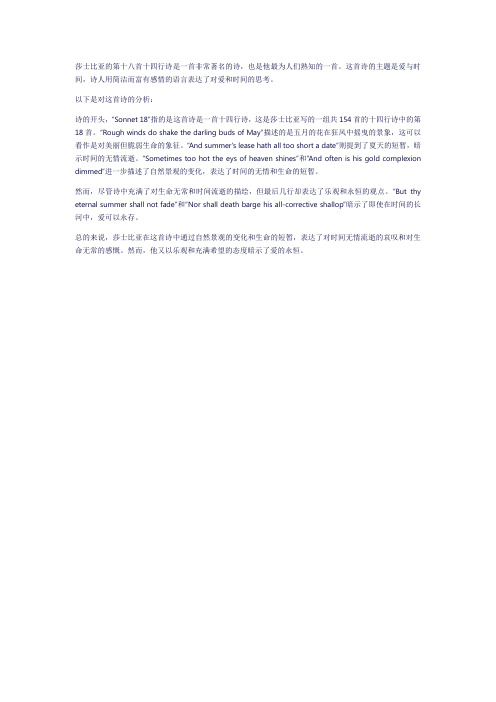
莎士比亚的第十八首十四行诗是一首非常著名的诗,也是他最为人们熟知的一首。
这首诗的主题是爱与时间,诗人用简洁而富有感情的语言表达了对爱和时间的思考。
以下是对这首诗的分析:
诗的开头,“Sonnet 18”指的是这首诗是一首十四行诗,这是莎士比亚写的一组共154首的十四行诗中的第18首。
“Rough winds do shake the darling buds of May”描述的是五月的花在狂风中摇曳的景象,这可以看作是对美丽但脆弱生命的象征。
“And summer's lease hath all too short a date”则提到了夏天的短暂,暗示时间的无情流逝。
“Sometimes too hot the eys of heaven shines”和“And often is his gold complexion dimmed”进一步描述了自然景观的变化,表达了时间的无情和生命的短暂。
然而,尽管诗中充满了对生命无常和时间流逝的描绘,但最后几行却表达了乐观和永恒的观点。
“But thy eternal summer shall not fade”和“Nor shall death barge his all-corrective shallop”暗示了即使在时间的长河中,爱可以永存。
总的来说,莎士比亚在这首诗中通过自然景观的变化和生命的短暂,表达了对时间无情流逝的哀叹和对生命无常的感慨。
然而,他又以乐观和充满希望的态度暗示了爱的永恒。
莎士比亚十四行诗Sonnet18ppt

通过对爱情、生命和时间的思考,莎士比亚也引发了读者对社会价值观的反思,即人们应该如何看待和评价爱情、 生命和时间等基本问题。
05
Sonnet 18的表演和演绎
舞台表演
莎士比亚的Sonnet 18在舞台上通常由一位演员以诗歌朗诵的形式呈现, 通过声音的抑扬顿挫、节奏和情感表达来传达诗中的意境和情感。
03
Sonnet 18在世界文学史上占据着举足轻重的地位,为世界文 学的发展和繁荣做出了重要的贡献。
04
Sonnet 18的解读和启示
对爱情的思考
爱情是永恒的
Sonnet 18中,莎士比亚赞美了爱情超越时间、死亡和季节的力量,表达了爱情 永恒不变的主题。
爱情的复杂性和矛盾性
诗中通过对比春天和黑夜、白昼和死亡等对立的概念,展现了爱情的复杂性和矛 盾性,即爱情既美好又痛苦,既充满希望又充满失望。
情感和主题表达
情感
这首诗表达了诗人对美丽事物的深深眷恋,以及对时间无情流逝的无奈和哀怨。
主题表达
通过细腻的情感表达和深入的主题探讨,这首诗展现了莎士比亚对人性、生命 和美的深刻思考。
03
Sonnet 18的文学价值
在莎士比亚作品中的地位
莎士比亚十四行诗是英国文学史上的重要遗产, 而Sonnet 18是其中的杰作之一。
主题、结构和语言。
03
该诗对浪漫主义、现代主义和后现代主义等文学流派
都有一定的影响,为世界文学的发展做出了贡献。
在世界文学史上的地位
01
Sonnet 18在世界文学史上具有重要地位,被广泛认为是英语 文学中的经典之作。
02
该诗以其卓越的艺术价值和深邃的思想内涵,成为了世界各 地学者和读者研究和欣赏的对象。
莎士比亚sonnet18

被机缘或无常的天道所摧折, Shall I compare thee to a summer's day? By chance, or nature's changing course, 我怎么能够把你来比作夏天? untrimmed. Thou art more lovely and more temperate. 没有芳艳不终于雕残或销毁。 But thy eternal summer shall not fade, 你不独比它可爱也比它温婉。 Rough winds do shake the darling buds of May,但是你的长夏永远不会雕落, Nor lose possession of that fair thou owest; 狂风把五月宠爱的嫩蕊作践, 也不会损失你这皎洁的红芳; And summer's lease hath all too short a date; Nor shall Death brag thou wanderest in his shade, 夏天出赁的期限又未免太短; 或死神夸口你在他影里漂泊, Sometimes too hot the eye of heaven shines, When in eternal lines to time thou growest. 当你在不朽的诗里与时同长。 天上的眼睛有时照得太酷烈, So long as men can breathe or eyes can see, And often is his gold complexion dimmed; 只要一天有人类,或人有眼睛, 它那炳耀的金颜又常遭掩蔽; So long lives this, and this gives life to thee. 这诗将长存,并且赐给你生命。
莎士比亚十四行诗原文译文探析
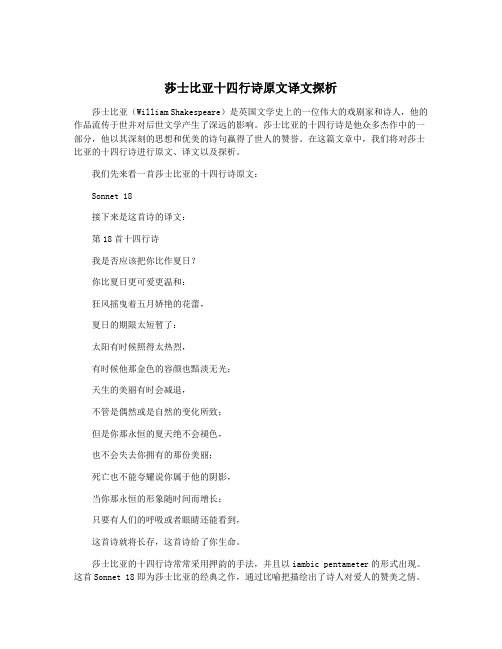
莎士比亚十四行诗原文译文探析莎士比亚(William Shakespeare)是英国文学史上的一位伟大的戏剧家和诗人,他的作品流传于世并对后世文学产生了深远的影响。
莎士比亚的十四行诗是他众多杰作中的一部分,他以其深刻的思想和优美的诗句赢得了世人的赞誉。
在这篇文章中,我们将对莎士比亚的十四行诗进行原文、译文以及探析。
我们先来看一首莎士比亚的十四行诗原文:Sonnet 18接下来是这首诗的译文:第18首十四行诗我是否应该把你比作夏日?你比夏日更可爱更温和:狂风摇曳着五月娇艳的花蕾,夏日的期限太短暂了:太阳有时候照得太热烈,有时候他那金色的容颜也黯淡无光;天生的美丽有时会减退,不管是偶然或是自然的变化所致;但是你那永恒的夏天绝不会褪色,也不会失去你拥有的那份美丽;死亡也不能夸耀说你属于他的阴影,当你那永恒的形象随时间而增长;只要有人们的呼吸或者眼睛还能看到,这首诗就将长存,这首诗给了你生命。
莎士比亚的十四行诗常常采用押韵的手法,并且以iambic pentameter的形式出现。
这首Sonnet 18即为莎士比亚的经典之作,通过比喻把描绘出了诗人对爱人的赞美之情。
诗的开篇即以修辞设问来呈现,作者在问自己是否应该将心上人比作夏日,然后通过下文的赞美,表达出对心上人更为深切的赞美之情。
他认为心上人的美丽胜过夏日,夏日虽然美丽,却不如心上人温和可爱。
由此,诗中呈现了作者对心上人的赞美之情。
在诗的后半部分,诗人使用了“永恒的夏天”来包含对心上人的赞美之语,不管是风吹雨打,都不会改变。
随后,诗人再以修辞手法呼唤死亡无法摧毁对心上人的赞美之情,并肯定了这份美丽将长存与时间,给了心上人永生。
通过以上对原文和译文的对比分析,我们不难发现莎士比亚的十四行诗所蕴含的深刻情感。
诗人通过对夏日和心上人的比较,抒发了对心上人深切的赞美之情,并以永恒的夏天来喻示继续深切的情感长存。
这首诗也正是莎士比亚情感抒发的一个缩影,其深情款款的语言和艺术手法让我们感受到了莎士比亚伟大的文学魅力。
莎士比亚sonnet182966中文翻译及评析
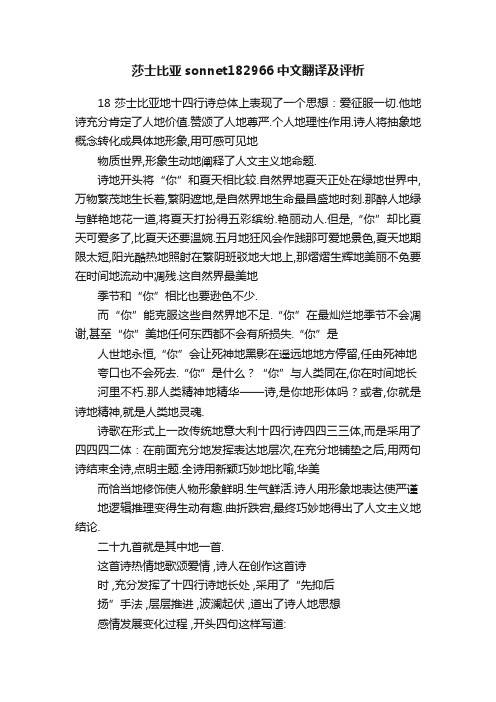
莎士比亚sonnet182966中文翻译及评析18莎士比亚地十四行诗总体上表现了一个思想:爱征服一切.他地诗充分肯定了人地价值.赞颂了人地尊严.个人地理性作用.诗人将抽象地概念转化成具体地形象,用可感可见地物质世界,形象生动地阐释了人文主义地命题.诗地开头将“你”和夏天相比较.自然界地夏天正处在绿地世界中,万物繁茂地生长着,繁阴遮地,是自然界地生命最昌盛地时刻.那醉人地绿与鲜艳地花一道,将夏天打扮得五彩缤纷.艳丽动人.但是,“你”却比夏天可爱多了,比夏天还要温婉.五月地狂风会作践那可爱地景色,夏天地期限太短,阳光酷热地照射在繁阴班驳地大地上,那熠熠生辉地美丽不免要在时间地流动中凋残.这自然界最美地季节和“你”相比也要逊色不少.而“你”能克服这些自然界地不足.“你”在最灿烂地季节不会凋谢,甚至“你”美地任何东西都不会有所损失.“你”是人世地永恒,“你”会让死神地黑影在遥远地地方停留,任由死神地夸口也不会死去.“你”是什么?“你”与人类同在,你在时间地长河里不朽.那人类精神地精华——诗,是你地形体吗?或者,你就是诗地精神,就是人类地灵魂.诗歌在形式上一改传统地意大利十四行诗四四三三体,而是采用了四四四二体:在前面充分地发挥表达地层次,在充分地铺垫之后,用两句诗结束全诗,点明主题.全诗用新颖巧妙地比喻,华美而恰当地修饰使人物形象鲜明.生气鲜活.诗人用形象地表达使严谨地逻辑推理变得生动有趣.曲折跌宕,最终巧妙地得出了人文主义地结论.二十九首就是其中地一首.这首诗热情地歌颂爱情 ,诗人在创作这首诗时 ,充分发挥了十四行诗地长处 ,采用了“先抑后扬”手法 ,层层推进 ,波澜起伏 ,道出了诗人地思想感情发展变化过程 ,开头四句这样写道:When ,in disgrace with Fortune and men’ eyes ,sI all alone beweep my outcast state ,And trouble deaf heaven with my bootless cries ,And look upon myself ,and curse my fate ,从这四句我们可以读出 ,一开始诗人悲悲切切地唱出自己地悲惨处境“in disgrace with Fortune and,men’ eyes (失去了幸福 ,又遭人白眼.”,慨叹自s )己生不逢时 ,身世凋零.幸福已离他远去 ,即便是“cries (哭喊)”也是“bootless (无用地)”,不过是“trouble(麻烦)”“deafheaven(聋耳地苍天)”,真是叫天天不应 ,叫地地不灵 ,诗人只有“curse my fate(悲叹时运不济)”.接着四句诗人更进一步吐露自己心中地自卑:Wishing me like to one more rich in hope ,Featured like him ,like him with friends possessed , Desiring this man’s art and that man’s scope ,With what I most enjoy contented least ,诗人羡慕人家“rich in hope(前程远大)”“Featured , (一表人才) ”“ , with friends possessed (盛友如云) ”“Desiring(渴望有)”别人地“art (权威)”“scope (才 , 华)”.同这许多人相比 ,诗人觉得自惭形秽 ,痛苦悲伤 ,感觉自己一无是处 ,尤其地看轻自己“With ,what I most enjoy contented least (于自己平素最得意地[指吟诗] ,倒最不满意)”,这四句诗真是把诗人地怨天尤人 ,痛苦万状地情绪推到了极点.可是接着四句 ,诗人笔锋一转 ,整个诗地情调骤然改变 ,Yet in these thoughts myself almost despising ,Haply I think on thee ,and then my state ,Like to the lark at break of day arisingFrom sullen earth ,sings hymns at heaven’ gate ;s从这四句可以看出 ,诗人因为“think on thee (想到了你)”而突然间精神振奋 ,神采飞扬 ,先前所有地忧郁一扫而空 ,刹那间喜上心头 ,唱出了喜悦地欢歌“Like to the lark at break of day arising/ From ,sullen earth ,sings hymns at heaven’s gate ; (顿时像破晓地云雀从阴郁地大地冲上了天门 ,歌唱起赞美诗来.”“thee”就是“爱”,是“thee”扭转了诗人心) ,中地乾坤 ,最后 ,诗人极其豪迈地唱到:For thy sweet love rememb ’red such wealthbrings ,That then I scorn to change my state with kings.这两个警句 ,画龙点睛地总结了全篇 ,也是诗人一贯地作法 ,与开头形成鲜明地对照.从而可以看出 ,诗人作这首诗经历了从消极到振奋 ,从忧郁到欢喜 ,从自卑到自豪 ,这一系列地变化 ,全都是因为“thee”,也是“爱”给了诗人强大地鼓舞力量 ,给了诗人莫大地勇气 ,信心和希望 ,使诗人放弃自卑“That then I scorn to change my state with kings. ,(教我不屑把处境跟帝王对调.”这也正是本诗地 )主题.“sweet love(甜爱)”究竟为何物 ? 为什么诗人一想到“thee”地“sweet love”,就会阴郁一扫而空 ,心境顿时明朗开阔.作者以为“sweet love”就是崇高地友谊 ,坚贞地爱情 ,在困难地时候 ,他们会给人鼓舞地力量.莎士比亚十四行诗第十八首Sonnet 18 铁冰译文1 Shall I compare thee to a summer's day? 我该不该把你比作怡人地夏天?2 Thou art more lovely and more temperate: 你却比她更加可爱更加温情.3 Rough winds do shake the darling buds of May, 五月地娇蕊总是被狂风吹断,4 And summer's lease hath all too short a date: 夏天也只是一道短暂地美景.5 Sometime too hot the eye of heaven shines, 苍穹地目光有时会过于灼热,6 And often is his gold complexion dimm'd; 那金色地脸庞也常黯淡无光.7 And every fair from fair sometime declines, 人间一切瑰丽终将失去秀色,8 By chance, or nature's changing course, untrimm'd; 湮没于不测风云和世事沧桑.9 But thy eternal summer shall not fade, 但是,你常青地夏季永不消逝,10 Nor lose possession of that fair thou owest; 你拥有地美丽也将永不折损,11 Nor shall Death brag thou wander'st in his shade, 或许死神地阴影会笼罩着你,12 When in eternal lines to time thou growest; 你却和这不朽地诗句千古长存.13 So long as men can breathe, or eyes can see, 只要人类还在呼吸.眼睛还在欣赏,14 So long lives this, and this gives life to thee. 我地诗就会活着,令你生命绽放.译注:原诗每行10个音节,非常整齐.前人翻译时总喜欢使译文每行保持字数相同,这其实是一种作茧自缚,强求形式上地绝对整齐,往往限制了内容地完美.前人地译文常常有凑韵(为了押韵,用词勉强).不流畅和用词搭配不当地毛病,其原因在此.更重要地是,英文原诗有着非常讲究地格律,每行都含有相同数量地重音节和轻音节,朗诵时每行所用时间基本一致;而对每行字数相同地中译文进行朗诵时,每行所用地时间则不尽相同,因为每行译文中所含有地虚词(如“地”.“地”.“了”,朗读时较轻声.短促)个数未必相同.因此,笔者地译文不强求每行字数相同,这样便将内容从形式中解放出来,得以更好地协调,且更利于押韵和用词地搭配.此诗地翻译中,值得注意地几处是:第3行:darling buds of May有人译为“五月宠爱地嫩蕊”,其实darling是“可爱地”之意,所以还是译为“五月地娇蕊”更好.第4行:lease前人经常译成“租赁地期限”,令人费解,应该是“持续地时间”之意.此行地意思是“夏天持续地时间实在太短”,这样地陈述缺乏诗味.笔者将该行意译为“夏天也只是一道极短地美景”,化用了中文地习语“好景不长”,不但忠实原文,颇有诗味,而且于与第二行译文押韵自然.第5行:一般认为该行中地eye of heaven是“太阳”地妙喻,因此前人常将此行译为“有时候天空地眼睛照得太灼热(或酷烈)”,这样保留了“眼睛”地意向,似乎很好,但从字面上看,“眼睛照”.“照得太热”这样地搭配在中文里是不太通顺地(中文更习惯说“晒得太热”),如果在译文中将“天空地眼睛”这几个字加上引号,可解决“眼睛热”搭配不当地问题,但无法解决“照得热”搭配不当地问题.笔者认为:eye除了“眼睛”之意,还有“眼神.目光”之意,shine除了“照耀”之意,还有“发光”之意,鉴此,不妨将此行译为“苍穹地目光有时过于灼热”,以“目光”译eye和shine,可谓一举两得,而且“灼热地目光”是中文里常用地搭配.第7-8行:这两句是说世上很多美好地东西,终究难免因遭受意外事故地摧残或在世事变迁中变得“物是人非”而不再美丽.前人地翻译喜将chance(在此应为“意外”之意)译为“机缘”,后者在中文里含有褒义,将其与“摧残”一词进行搭配,是不恰当地.“机缘”往往是“成全”,而非“摧残”.笔者将其译为“不测风云”,将nature's changing course(自然界地变化过程)译为“世事沧桑”,富有诗味.第11行:此行地意思是“死神不能夸耀说你在他地阴影里徘徊”,这样地表达很有诗味,但字数太多.笔者认为,“死神不能夸耀”地原因是:尽管根据自然规律“你”有朝一日会被死神地阴影所笼罩,但“你”将在我地诗句中获得永生,死神仅仅能能让“你”肉体毁灭,这没什么值得夸耀地.翻译时,我舍弃了“夸耀”.“徘徊”等意象,浅化为“或许死神地阴影会笼罩着你”(增加了“笼罩”地意象),足以达意,也不失忠实.根据著名翻译家许渊冲先生地理论,这是“依其精而异其粗”地译法.第13-14行:笔者将see译为“欣赏”,将this译为“我地诗”,都是对原文地“深化”,比前人译为“看清”.“此诗”更能表现出作者地自信——坚信自己地诗会被千古传诵并具有巨大地威力,能令“你”在诗句中永生.与前人地译文一较高下(1)梁宗岱译文铁冰点评1 我怎么能够把你来比作夏天?2 你不独比它可爱也比它温婉:3 狂风把五月宠爱地嫩蕊作践, “嫩蕊”似乎不应由“五月”来“宠爱”4 夏天出赁地期限又未免太短: lease有“租赁期”.“持续期”等义,此处应取后者5 天上地眼睛有时照得太酷烈, “眼睛…照”搭配不佳,shine可作“发光”解6 它那炳耀地金颜又常遭掩蔽:“炳耀”一词太文,且可有可无7 被机缘或无常地天道所摧折, “机缘”含褒义,有悖于“摧折”一词地感情色彩8 没有芳艳不终于雕残或销毁. “没有…不终于”不符合中文行文习惯,且很拗口9 但是你地长夏永远不会凋落, “长夏凋落”搭配不佳10 也不会损失你这皎洁地红芳, “皎洁”是白色,与“红芳”搭配,矛盾11 或死神夸口你在他影里漂泊, 此句句意与上下文脱节12 当你在不朽地诗里与时同长. “与时同长”不符合中文行文习惯13 只要一天有人类,或人有眼睛, or译为“或”,很生硬14 这诗将长存,并且赐给你生命.注:梁宗岱(1903-1983),我国著名诗人.翻译家, 精通英.法.德语,所译莎氏十四行诗享誉甚高.(2)陈黎译文1 我该把你比拟做夏天吗?2 你比夏天更可爱,更温婉:3 狂风会把五月地娇蕊吹落,4 夏天出租地期限又太短暂:“出租”为误译5 有时天上地眼睛照得太热, “眼睛照”.“照得热”搭配不佳6 他金色地面容常常变阴暗;7 一切美地事物总不免凋败, 此句陈述平淡,无诗味8 被机缘或自然地代谢摧残:“机缘”地感情色彩不当9 但你永恒地夏天不会褪色,10 不会失去你所拥有地美善,11 死神也不能夸说你在他阴影里徘徊, 11.12两行条件状语后置,不符合中文习惯12 当你在永恒地诗行里与时间同久长:“与时间同久长”不顺口13 只要人们能呼吸或眼睛看得清, “或”字大煞风景14 此诗将永存,并且赐给你生命.(3)“酒城译痴”地译文1 我怎能把你比作宜人地夏天?2 你比它更加可爱也更加温婉:3 狂风把五月钟爱地蓓蕾摧残,4 夏天延续地时间未免太短暂:第1-4行译得很好5 苍穹地眼睛有时照得太灼热, “苍穹地眼睛”应加引号6 金色地容颜常变得朦胧暗淡:谁地“金色容颜”?7 遭受机缘或自然变化地摧折;“机缘”用词不当8 美好地事物终究会不免雕残. “会”和“不免”语义重复9 但是你永恒地夏天不会衰败,10 你拥有地美丽会永伴你身旁, 人死后不再有身体,且美丽永存也不仅限于身旁11 死神不夸耀你在他影里徘徊, “不夸耀”和“不能夸耀”是两回事12 当你在不朽诗行里与时同长. “与时同长”不符合中文行文习惯13 只要人类能呼吸眼睛能看清,14 此诗万世长存并赐予你生命.。
莎士比亚十四行诗Sonnet.18

thou=you(作为主语,也就是说,动作的发出者)art=arethee=you(作为宾语,也就是说,动作的接受者)而且还有thy=yourhath=hasdimm'd是dimmed 的缩写,而wand'ring则是wandering的缩写.发音跟原词基本一样.唯一区别是wand'ring 是两个音节,wandering是三个音节.这种写法在讲究韵律的诗词中最为常见,一般是为了让句子符合音步。
ow'st(=own) vt.[W] 有,拥有Ow'st is short for ow(ne)st, so it means you possess or you have.wand'rest (=wander) 漫游;闲逛;流浪;徘徊grow'st(=grow)成长,生长。
莎士比亚时代,owe与own通用。
古英语第二人称单数后加st或est。
Sonnet.18QuatrainⅠ:A:Shall I compare thee to a summer's day?可否允我将你比作那初夏之日B:Thou art more lovely and more temperate.然你惟更温柔,亦更可亲A:Rough winds do shake the darling buds of May,狂野之风总不免吹摇那五月花蕾B:And summer's lease hath all too short a date.夏日固美,亦不免失之短暂QuatrainⅡ:C:Sometime too hot the eye of heaven shines,有时那天堂之眼光芒过烈D:And often is his gold complexion dimm'd;有时他那金色容颜又被云层遮掩C:And every fair from fair sometime declines,世间之美总会走向衰败D:By chance or nature's changing course untrimmed.因了命运,或是自然的不测之威Quatrain Ⅲ:E:But thy eternal summer shall not fade,然而如永恒夏日般的你却脱出此列F:Nor lose possession of that fair thou ow'st;那与生俱来的美从不曾减损半分E:Nor shall Death brag thou wander'st in his shade,哪怕死神亦无法染指你的存在F:When in eternal lines to time thou grow'st.只因你与时间并骑,驶向无尽之海Couplet:G:So long as men can breathe, or eyes can see,但分人类一息尚在,双目能开G:So long lives this, and this gives life to thee.这诗句便不灭,同你的生命一道永恒盛开。
莎士比亚十四行诗精选
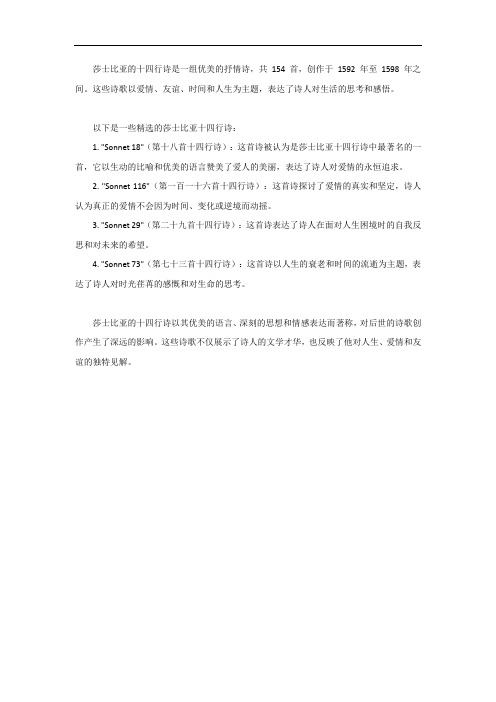
莎士比亚的十四行诗是一组优美的抒情诗,共154 首,创作于1592 年至1598 年之间。
这些诗歌以爱情、友谊、时间和人生为主题,表达了诗人对生活的思考和感悟。
以下是一些精选的莎士比亚十四行诗:
1. "Sonnet 18"(第十八首十四行诗):这首诗被认为是莎士比亚十四行诗中最著名的一首,它以生动的比喻和优美的语言赞美了爱人的美丽,表达了诗人对爱情的永恒追求。
2. "Sonnet 116"(第一百一十六首十四行诗):这首诗探讨了爱情的真实和坚定,诗人认为真正的爱情不会因为时间、变化或逆境而动摇。
3. "Sonnet 29"(第二十九首十四行诗):这首诗表达了诗人在面对人生困境时的自我反思和对未来的希望。
4. "Sonnet 73"(第七十三首十四行诗):这首诗以人生的衰老和时间的流逝为主题,表达了诗人对时光荏苒的感慨和对生命的思考。
莎士比亚的十四行诗以其优美的语言、深刻的思想和情感表达而著称,对后世的诗歌创作产生了深远的影响。
这些诗歌不仅展示了诗人的文学才华,也反映了他对人生、爱情和友谊的独特见解。
sonnet18的修辞手法

sonnet18的修辞手法
Sonnet 18是莎士比亚的一首十四行诗,也被称为"Shall I compare thee to a summer's day?",它使用了多种修辞手法来强化诗歌的表达和情感。
首先,Sonnet 18中使用了比喻。
诗中作者将自己的恋人比作夏日,以突出其美丽和永恒的特质。
这种比喻使读者能够更清晰地感受到作者对恋人的赞美和珍视。
其次,Sonnet 18使用了拟人。
在诗中,夏天被拟人化为时而太热、时而太凉的人物,以突出恋人的永恒美丽。
这种拟人手法使得读者更容易将诗中的情感和形象与自己的生活经验联系起来。
此外,Sonnet 18还使用了对比。
诗中作者将夏天的美丽与恋人的美丽进行对比,强调了恋人的美丽胜过夏天的美丽。
这种对比手法使得诗中的情感更加鲜明,让读者更深刻地感受到作者对恋人的赞美之情。
最后,Sonnet 18还使用了排比。
在诗中,作者通过排比的手法列举了夏天的缺点和变化,以突出恋人的永恒美丽。
这种排比的
修辞手法使得诗歌更加生动和有力,增强了诗中情感的表达和力量。
总的来说,Sonnet 18使用了比喻、拟人、对比和排比等多种
修辞手法,这些手法使得诗歌更加丰富和生动,突出了作者对恋人
美丽的赞美和珍视。
莎士比亚十四行诗第十八首

莎士比亚十四行诗第十八首Sonnet 18 铁冰译文1 Shall I compare thee to a summer's day 我该不该把你比作怡人的夏天?2 Thou art more lovely and more temperate: 你却比她更加可爱更加温情。
3 Rough winds do shake the darling buds of May, 五月的娇蕊总是被狂风吹断,4 And summer's lease hath all too short a date: 夏天也只是一道短暂的美景。
5 Sometime too hot the eye of heaven shines, 苍穹的目光有时会过于灼热,6 And often is his gold complexion dimm'd; 那金色的脸庞也常黯淡无光。
7 And every fair from fair sometime declines, 人间一切瑰丽终将失去秀色,8 By chance, or nature's changing course, untrimm'd; 湮没于不测风云和世事沧桑。
9 But thy eternal summer shall not fade, 但是,你常青的夏季永不消逝,10 Nor lose possession of that fair thou owest; 你拥有的美丽也将永不折损,11 Nor shall Death brag thou wander'st in his shade, 或许死神的阴影会笼罩着你,12 When in eternal lines to time thou growest; 你却和这不朽的诗句千古长存。
13 So long as men can breathe, or eyes can see, 只要人类还在呼吸、眼睛还在欣赏,14 So long lives this, and this gives life to thee. 我的诗就会活着,令你生命绽放。
sonnet18诗歌解析
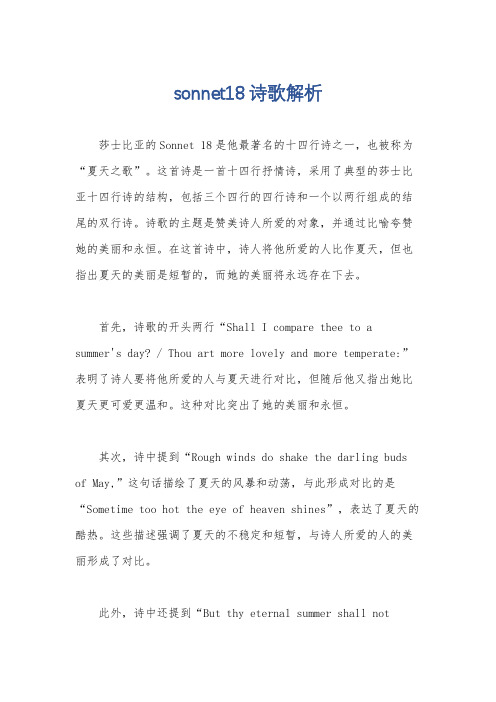
sonnet18诗歌解析莎士比亚的Sonnet 18是他最著名的十四行诗之一,也被称为“夏天之歌”。
这首诗是一首十四行抒情诗,采用了典型的莎士比亚十四行诗的结构,包括三个四行的四行诗和一个以两行组成的结尾的双行诗。
诗歌的主题是赞美诗人所爱的对象,并通过比喻夸赞她的美丽和永恒。
在这首诗中,诗人将他所爱的人比作夏天,但也指出夏天的美丽是短暂的,而她的美丽将永远存在下去。
首先,诗歌的开头两行“Shall I compare thee to a summer's day? / Thou art more lovely and more temperate:”表明了诗人要将他所爱的人与夏天进行对比,但随后他又指出她比夏天更可爱更温和。
这种对比突出了她的美丽和永恒。
其次,诗中提到“Rough winds do shake the darling buds of May,”这句话描绘了夏天的风暴和动荡,与此形成对比的是“Sometime too hot the eye of heaven shines”,表达了夏天的酷热。
这些描述强调了夏天的不稳定和短暂,与诗人所爱的人的美丽形成了对比。
此外,诗中还提到“But thy eternal summer shall notfade”,这句话表达了诗人对所爱人美丽永恒的信念,即使时间流逝,她的美丽也不会凋谢。
最后,诗歌的结尾两行“So long as men can breathe oreyes can see, / So long lives this, and this gives life to thee.”表达了诗人的信念,即只要人类存在,这首诗也将永存下去,而她的美丽也将因此而得以永生。
总的来说,Sonnet 18是一首赞美之歌,通过对比夏天的短暂和变化与所爱人的永恒美丽,表达了诗人对所爱人的赞美和珍视之情。
这首诗以其优美的语言和深刻的意境,成为了莎士比亚诗歌中的经典之作。
莎士比亚的第十八首十四行诗

莎士比亚的第十八首十四行诗莎士比亚的第18首十四行诗是他的一首著名Sonnet(十四行诗),以下是该诗的原文:Shall I compare thee to a summer's day? Thou art more lovely and more temperate: Rough winds do shake the darling buds of May, And summer's lease hath all too short a date: Sometime too hot the eye of heaven shines, And often is his gold complexion dimmed; And every fair from fair sometime declines, By chance or nature's changing course untrimmed; But thy eternal summer shall not fade Nor lose possession of that fair thou owest; Nor shall Death brag thou wanderest in his shade, When in eternal lines to time thou growest: So long as men can breathe or eyes can see, So long lives this, and this gives life to thee.这首诗是一首表达爱情赞美的十四行诗,诗人将心爱之人与夏日做了比较,认为她比夏天更加美丽和温和,不会随着时间的流逝而变淡,也不会被死亡所征服,因为她将永远存在于这首诗中。
这首诗以其深情而著名,被广泛阅读和欣赏。
莎士比亚诗歌《十四行诗第十八首》原文及赏析
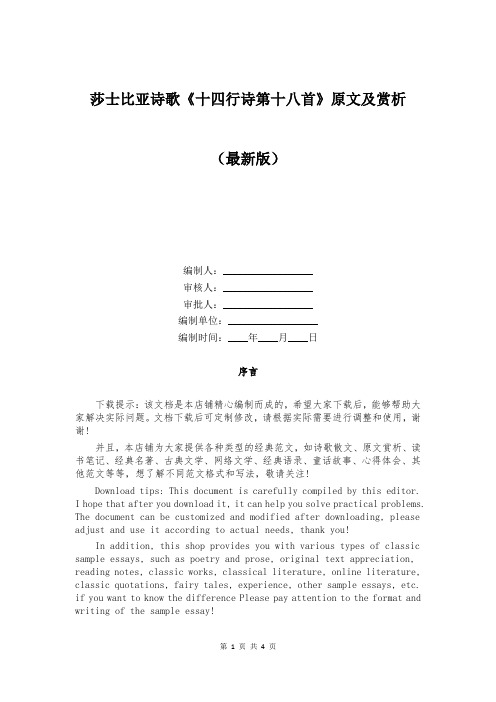
莎士比亚诗歌《十四行诗第十八首》原文及赏析(最新版)编制人:__________________审核人:__________________审批人:__________________编制单位:__________________编制时间:____年____月____日序言下载提示:该文档是本店铺精心编制而成的,希望大家下载后,能够帮助大家解决实际问题。
文档下载后可定制修改,请根据实际需要进行调整和使用,谢谢!并且,本店铺为大家提供各种类型的经典范文,如诗歌散文、原文赏析、读书笔记、经典名著、古典文学、网络文学、经典语录、童话故事、心得体会、其他范文等等,想了解不同范文格式和写法,敬请关注!Download tips: This document is carefully compiled by this editor.I hope that after you download it, it can help you solve practical problems. The document can be customized and modified after downloading, please adjust and use it according to actual needs, thank you!In addition, this shop provides you with various types of classic sample essays, such as poetry and prose, original text appreciation, reading notes, classic works, classical literature, online literature, classic quotations, fairy tales, experience, other sample essays, etc. if you want to know the difference Please pay attention to the format and writing of the sample essay!莎士比亚诗歌《十四行诗第十八首》原文及赏析【导语】:我怎样能把你比做夏天? 你比它更可爱也更温和; 五月的娇蕾有暴风震颠, 夏季的寿命很短就度过。
莎士比亚十四行诗_Sonnet_18
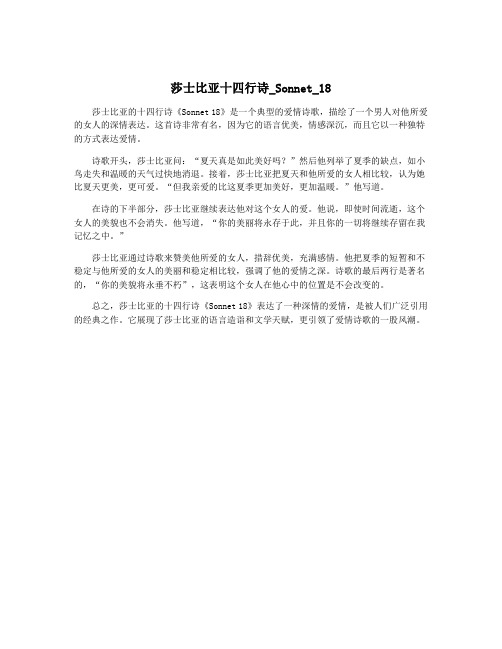
莎士比亚十四行诗_Sonnet_18
莎士比亚的十四行诗《Sonnet 18》是一个典型的爱情诗歌,描绘了一个男人对他所爱的女人的深情表达。
这首诗非常有名,因为它的语言优美,情感深沉,而且它以一种独特的方式表达爱情。
诗歌开头,莎士比亚问:“夏天真是如此美好吗?”然后他列举了夏季的缺点,如小鸟走失和温暖的天气过快地消退。
接着,莎士比亚把夏天和他所爱的女人相比较,认为她比夏天更美,更可爱。
“但我亲爱的比这夏季更加美好,更加温暖。
”他写道。
在诗的下半部分,莎士比亚继续表达他对这个女人的爱。
他说,即使时间流逝,这个女人的美貌也不会消失。
他写道,“你的美丽将永存于此,并且你的一切将继续存留在我记忆之中。
”
莎士比亚通过诗歌来赞美他所爱的女人,措辞优美,充满感情。
他把夏季的短暂和不稳定与他所爱的女人的美丽和稳定相比较,强调了他的爱情之深。
诗歌的最后两行是著名的,“你的美貌将永垂不朽”,这表明这个女人在他心中的位置是不会改变的。
总之,莎士比亚的十四行诗《Sonnet 18》表达了一种深情的爱情,是被人们广泛引用的经典之作。
它展现了莎士比亚的语言造诣和文学天赋,更引领了爱情诗歌的一股风潮。
sonnet 18 中文格律诗
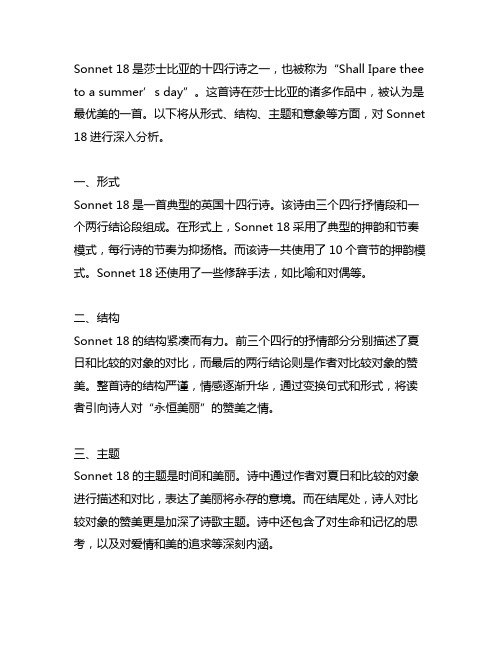
Sonnet 18是莎士比亚的十四行诗之一,也被称为“Shall Ipare thee to a summer’s day”。
这首诗在莎士比亚的诸多作品中,被认为是最优美的一首。
以下将从形式、结构、主题和意象等方面,对Sonnet 18进行深入分析。
一、形式Sonnet 18是一首典型的英国十四行诗。
该诗由三个四行抒情段和一个两行结论段组成。
在形式上,Sonnet 18采用了典型的押韵和节奏模式,每行诗的节奏为抑扬格。
而该诗一共使用了10个音节的押韵模式。
Sonnet 18还使用了一些修辞手法,如比喻和对偶等。
二、结构Sonnet 18的结构紧凑而有力。
前三个四行的抒情部分分别描述了夏日和比较的对象的对比,而最后的两行结论则是作者对比较对象的赞美。
整首诗的结构严谨,情感逐渐升华,通过变换句式和形式,将读者引向诗人对“永恒美丽”的赞美之情。
三、主题Sonnet 18的主题是时间和美丽。
诗中通过作者对夏日和比较的对象进行描述和对比,表达了美丽将永存的意境。
而在结尾处,诗人对比较对象的赞美更是加深了诗歌主题。
诗中还包含了对生命和记忆的思考,以及对爱情和美的追求等深刻内涵。
四、意象Sonnet 18使用了丰富的意象,如夏日、阳光、金色、气候、自然等。
这些意象不仅仅是诗中的描写,更是诗人对美好事物的赞美。
通过对自然界的描绘,诗人塑造出了诗中比较对象的完美形象,表达了作者内心深处对美好事物的向往和追求。
Sonnet 18无论从形式、结构、主题还是意象等方面都展现了莎士比亚在诗歌创作上的卓越才华和深厚功底。
它以清晰的逻辑和深刻的内涵,表达了诗人对美的赞美和对永恒美好的追求。
这使得Sonnet 18成为了莎士比亚诗歌创作的代表作之一,同时也成为了世界文学史上不朽的经典之作。
Sonnet 18是英国文学史上不朽的经典之作,其中蕴含了深刻的人文情感和对美好事物的赞美。
从古至今,它一直是文学爱好者和学者们津津乐道的对象。
十四行诗18英文赏析-莎士比亚[整理版]
![十四行诗18英文赏析-莎士比亚[整理版]](https://img.taocdn.com/s3/m/faf35c37bdd126fff705cc1755270722192e59c0.png)
莎士比亚的第18首十四行诗的英文赏析我能否将你比作夏天?你比夏天更美丽温婉。
狂风将五月的蓓蕾凋残,夏日的勾留何其短暂。
休恋那丽日当空,转眼会云雾迷蒙。
休叹那百花飘零,催折于无常的天命。
唯有你永恒的夏日常新,你的美貌亦毫发无损。
死神也无缘将你幽禁,你在我永恒的诗中长存。
只要世间尚有人吟诵我的诗篇,这诗就将不朽,永葆你的芳颜。
这首诗的艺术特点首先是在于它有着双重主题:一是赞美诗人爱友的美貌,二是歌颂了诗歌艺术的不朽力量。
其次就是诗人在诗中运用了新颖的比喻,但又自然而生动。
Sonnet 18, often alternately titled Shall I compare thee to a summer's day?, is one of the best-known of 154 sonnets written by the English playwright and poet William Shakespeare. Part of the Fair Y outh sequence (which comprises sonnets 1-126 in the accepted numbering stemming from the first edition in 1609), it is the first of the cycle after the opening sequence now described as the Procreation sonnets. Most scholars now agree that the original subject of the poem, the beloved to whom the poet is writing, is a male, though the poem is commonly used to describe a woman.In the sonnet, the poet compares his beloved to the summer season, and argues that his beloved is better. The poet also states that his beloved will live on forever through the words of the poem. Scholars have found parallels within the poem to Ovid's Tristia and Amores, both of which have love themes. Sonnet 18 is written in the typical Shakespearean sonnet form, having 14 lines of iambic pentameter ending in a rhymed couplet. Detailed exegeses have revealed several double meanings within the poem, giving it a greater depth of interpretation.Sonnet 18 is a typical English or Shakespearean sonnet. It consists of three quatrains followed by a couplet, and has the characteristic rhyme scheme: abab cdcd efef gg. The poem carries the meaning of an Italian or Petrarchan Sonnet. Petrarchan sonnets typically discussed the love and beauty of a beloved, often an unattainable love, but not always.[5] It also contains a volta, or shift in the poem's subject matter, beginning with the third quatrain.A facsimile of the original printing of Sonnet 18.The poem starts with a line of adoration to the beloved—"Shall I compare thee to a summer's day?" The speaker then goes on to say that the beloved being described is both "more lovely and more temperate" than a summer's day. Thespeaker lists some things that are negative about summer. It is too short—"summer's lease hath all too short a date"—and sometimes the sun shines too hot—"Sometime too hot the eye of heaven shines." However, the beloved being described has beauty that will last forever, unlike the fleeting beauty of a summer's day. By putting his love's beauty into the form of poetry, the poet is preserving it forever by the power of his written words. "So long as men can breathe, or eyes can see, So long lives this, and this gives life to thee." The hope is that the two lovers can live on, if not through children, then through the poems brought forth by their love which, unlike children, will not fadeA major feature of this poem - analogy. Begins with the first sentence, put "you" and "Summer" as a analogy, compare the second line of the initial determination: Are you more lovely than the summer, more gentle. The difference is due to produce its in-depth analysis of 3 to 14 lines. Specifically, the first line of 3.4.5.6.7.8 enumerated the "summer" all kinds of regrets, and 9.10.11.12.13.14 line tells the "you" all kinds of advantages compared to the natural draw a final conclusion: "Y ou" is far better than "Summer," "you" because in his poetry between the lines but also has a life, and time forever. Also noteworthy is the verse 13 and 14 are also, by analogy emphasized the "eternal nature."Throughout the poem, the poet freely to the "you" talk, it seems that "you" is a living person, to listen to his voice, understanding his thinking. So this poem can be said to be people in the application of techniques based on the written. The poem "Y ou" refers to an object, academia, there are two explanations, one view is that it refers to beauty, and the other that it refers to poetry to express the good things. Now most scholars prefer the latter.One of the best known of Shakespeare’s sonnets, Sonnet 18 is memorable for the skillful and varied presentation of subject matter, in which the poet’s feelings reach a level of rapture unseen in the previous sonnets. The poet here abandons his quest for the youth to have a child, and instead glories in the youth’s beauty.On the surface, the poem is simply a statement of praise about the beauty of the beloved; summer tends to unpleasant extremes of windiness and heat, but the beloved is always mild and temperate. Summer is incidentally personified as the "eye of heaven" with its "gold complexion"; the imagery throughout is simple and unaffected, with the "darling buds of May" giving way to the "eternal summer", which the speaker promises the beloved. The language, too, is comparatively unadorned for the sonnets; it is not heavy with alliteration or assonance, and nearly every line is its own self-contained clause--almost every line ends with some punctuation, which effects a pause.Initially, the poet poses a question―”Shall I compare thee to a summer’s day?”―and then reflects on it, remarking that the youth’s beauty far surpasses summer’s delights. The imagery is the very essence of simplic ity: “wind”and “buds.”In the fourth line, legal terminology―”summer’s lease”―is introduced in contrast to the commonplace images in the first three lines. Note also the poet’s use of extremes in the phrases “more lovely,”“all too short,”and “too hot”; these phrases emphasize the young man’s beauty.Although lines 9 through 12 are marked by a more expansive tone and deeper feeling, the poetreturns to the simplicity of the opening images. As one expects in Shakespeare’s sonnets, the proposition that the poet sets up in the first eight lines―that all nature is subject to imperfection―is now contrasted in these next four lines beginning with “But.”Although beauty naturally declines at some point―”And every fair from fair sometime declines”―the youth’s beauty will not; his unchanging appearance is atypical of nature’s steady progression. Even death is impotent against the youth’s beauty. Note the ambiguity in the phrase “eternal lines”: Are these “lines”the poet’s verses or the youth’s hoped-for children? Or are they simply wrinkles meant to represent the process of aging? Whatever the answer, the poet is jubilant in this sonnet because nothing threatens the young man’s beautiful appearance.Sonnet 18 is the first poem in the sonnets not to explicitly encourage the young man to have children. The "procreation" sequence of the first 17 sonnets ended with the speaker's realization that the young man might not need children to preserve his beauty; he could also live, the speaker writes at the end of Sonnet 17, "in my rhyme." Sonnet 18, then, is the first "rhyme"--the speaker's first attempt to preserve the young man's beauty for all time. An important theme of the sonnet (as it is an important theme throughout much of the sequence) is the power of the speaker's poem to defy time and last forever, carrying the beauty of the beloved down to future generations. The beloved's "eternal summer" shall not fade precisely because it is embodied in the sonnet: "So long as men can breathe or eyes can see," the speaker writes in the couplet, "So long lives this, and this gives life to thee."大多数莎学家认为,是作者赞美好友的超常之美的。
- 1、下载文档前请自行甄别文档内容的完整性,平台不提供额外的编辑、内容补充、找答案等附加服务。
- 2、"仅部分预览"的文档,不可在线预览部分如存在完整性等问题,可反馈申请退款(可完整预览的文档不适用该条件!)。
- 3、如文档侵犯您的权益,请联系客服反馈,我们会尽快为您处理(人工客服工作时间:9:00-18:30)。
◆ period:14th -17th
●Political influence: the transitional period from feudal system to capitalist system) ●Religious influence: make a change from roman Catholic (罗马天主教)to Protestant(新教) ●Cultural influence:the arising of Humanism, which plays a significant role to the flowering of European literature ,art, science and so on.
Several types of sonnets
Italian (Petrarchan)---- this sonnet is split into two parts(an octave(八
度音阶)and a sestet(六行诗节)). The octave is composed of two quatrains(四行诗体). Its rhyming(韵脚) is “abba abba” The rhyme pattern of sestet varies . The most often used rhyming is ”cde cde” or “cdc cdc” The turn occurs at the end of the octave and is developed and closed in the sestet.
background
Form
Three types
Introduction for shakespeare’s sonnets General introduction
Characteristics of sonnet 18
Specific explanation of sonnet 18 Translation of sonnet 18
English renaissance
Period :early 16th – early 17th A star in the field of English literature
Drama sonnet
38 154
General idea
development Definition Introduction for sonnets
• • • • • • • • • • • • • •
我是否能把你与夏日比较? 尽管你的美丽和温柔远超: 狂风肆虐五月柔嫩的花苞, 孟夏总叹吉日良辰的短少: 太阳普照下时而炎热难当, 夕阳西沉处常常金辉黯淡; 无奈花开花谢中红颜易伤, 苦于滚滚红尘里世事无常; 唯有你好似永夏经年不衰, 不失优雅气质而风华绝代; 死亡阴霾遮掩不住的美态, 定格在不朽诗篇字里行外: 只要人文延续,诵读不止, 传承此诗,你也流芳百世。
Time place Renaissance Italy-
influenced by Humanism (not living for God admiration for human beauty and human achievements mould the world as he desires attain the happiness by reasonable practice)
Spenserian(斯宾塞体 ) ----this contains 3 quatrains and one heroic couplet
(英雄双韵体)at the end, Its rhyming is "abab bcbc cdcd ee"
the appreciation of short clip
Theme of sonnet 18
Definition of sonnet
A sonnet is a lyric (抒情诗) of fourteen lines, usually in iambic pentameter, restricted to a definite rhyme rule
In the early sixteenth century ,the sonnets were gradually translated into English and the type of the poems came about in England In the late sixteenth century, the sonnet became the most popular type of the English poems . The well-known poets such as Spencer ,Sidney ,and Shakespeare did great contribution to its development
⒊personification ⒋(metaphor)
⒌(P)
⒍ (p)
⒎(1 the one who owns beauty; 2 youth and beautiful complexion ) pun
⒐ paradox) (summer---youth and beautiful complexion) (metaphor) pun 双关( the “summer” here with the “summer”
Characteristics of the poem
• • • • Careful structure Free style like the way of creating dramas Imaginable languages Full of emotions
★Describe destructive power of time
on the line 1 and4) ⒑(fair ---youth and beautiful complexion ) ⒓(synecdoche)(借代 the whole is expressed by the part)
translation
我可否将你比作那动人的夏日? 尽管与你的可爱与温情相较,夏日要逊色很多: 五月骄人的花蕾被粗粝的风无情的晃动, 短暂的夏日也稍纵即逝: 有时烈日当空,光芒万丈, 有时却乌云密布,黯淡了太阳的光辉, 再美的人或物也会变得风华不再, 可能是因为偶然,也可能是因为在岁月更替,时光荏苒中慢慢消磨而去: 但是你那如夏天般的青春永远都不会消褪, 你所拥有的美好与美丽也不会消失 , 死神也无法夸口,无法将你纳入自己的阴影之下, 当你使自己融入了我这永恒的诗篇中, 只要人类仍然繁衍生息在滚滚红尘中, 只要你与诗歌共存,它会使你永葆青春。
⒈ Shall I /compare /thee to /a
⒈simile--- considering the climate,
the most days of summer in England are pleasant but not hot for one’s living. it also implies that his friend is as energetic and active as summer)
English (Shakespearian)----this contains 3 quatrains and one heroic
couplet (英雄双韵体)at the end. Its rhyming is "abab cdcd efef gg" The turn comes at or near line 13----the start of “gg”
Shakespeare's Sonnets
Author(s) Country Language
William Shakespeare England Early Modern English
Genre(s)
works
Renaissance poetry
154
thine ---yours Thou ---you Thee ---you(object form) Thy ---your Hath --- the third person present sense of “have”
★The eternal beauty that are bought from the poem to the one he loves ★A nice summer's day is usually transient, but the beauty in
sum/mer‘s day? ⒉Thou art/ more love/ly and / more tem/perate(温和,温柔): ⒊Rough winds/do shake /the dar/ling buds/ of May, ⒋And sum/mer‘s lease /hath all/ too short/ a date: ⒌Sometimes/ too hot /the eye o/f hea/ven shines, ⒍And often/ is his /gild com/plexion/ dimmed, ⒎And e/very fair /from fair /sometime/declines ⒏By chance /or na/ture‘s chan/ging course /untrimmed: ⒐But thy/ eter/nal sum/mer shall /not fade, ⒑Nor lose /posse/ssion of /that fair /thou ow‘st, ⒒Nor shall/ Death brag/ thou wan/der‘st in /his shade, ⒓When in/ eter/nal lines/ to time /thou grow’st: ⒔So long /as men /can breathe /or eyes/ can see, ⒕So long/ lives this /and this /gives life /to thee.
